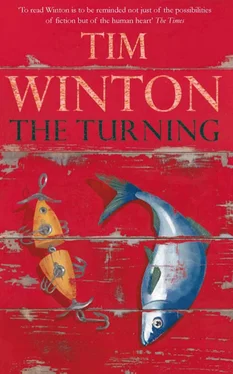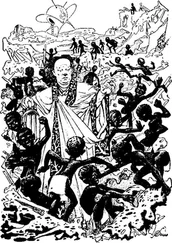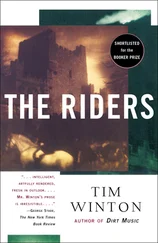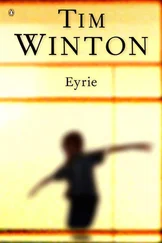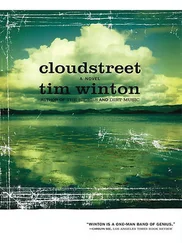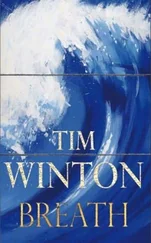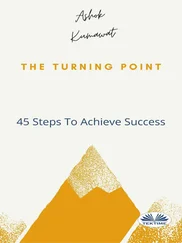When he went down, sliding sideways like a banking aircraft out there in the ruffled shimmer of the swamp’s eye, I really didn’t think that my smug feeling, my satisfied pity about his English teeth, had caused the capsize. He didn’t come up. I never even hated him, though I’d never called anyone shit before. After the water settled back and shook itself smooth again like hung washing, there wasn’t a movement. No sign.
I went home and said nothing.
Police dragged the swamp, found the car roof but no body. Across the road the Mannerings’ lawn grew long and cries louder than any mower drifted over day and night.
That Christmas we drove the Falcon across the Nullarbor Plain to visit the Eastern States which is what we still call the remainder of Australia. The old man sealed the doors with masking tape and the four of us sat for days breathing white dust. The limestone road was marked only with blown tyres and blown roos. Near the South Australian border we stopped at the great blowhole that runs all the way to the distant sea. Its rising gorge made me queasy. I thought of things sucked in, of all that surging, sucking water beneath the crust of the wide brown land.
Back home, though they did not find his body, I knew that Alan Mannering was in the swamp. I thought of him silent, fair, awful, encased in the black cake-mix of sediment down there.
The next year, come winter, the night air was musky with smoke and sparks hung in the sky like eyes. Bulldozers towing great chains and steel balls mowed down tuart trees and banksias.
I learned to spell aquifer.
Three doors up, Wally Burniston came home drunk night after night. His wife Beryl locked him out and if he couldn’t smash his way in he lay bawling on the verandah until he passed out. Some school mornings I passed his place and saw him lying there beside the delivered milk, his greasy rocker’s haircut awry, his mouth open, shoes gone.
New streets appeared even while the bush burned. In the phone box, which stank of cigarettes, I listened to the man from 1194 and knew that he was making the time up as he went along.
I saw the rainbow mist of the market garden sprinklers and felt uneasy. I thought of Alan Mannering in that mist. He’d have been liquid long ago. I was eleven now, I knew this sort of thing.
As our neighbourhood became a suburb, and the bush was heaved back even further on itself, there was talk of using the swamp for landfill, making it a dump so that in time it could be reclaimed. But the market gardeners were furious. Their water came from the swamp, after all. Water was no longer cheap.
The van Gelders divorced. Wally Burniston was taken somewhere, I never found out where. One Sunday afternoon I found myself in the van Gelders’ backyard scrounging for a companion when I came upon Mrs van Gelder at the back step. I coasted over to her on my Dragstar to ask where her son might be but the sight of her struck me dumb. She had kohl around her eyes and a haircut that made her look like Cleopatra as played by Elizabeth Taylor. Her dress was short and half her buttons were undone. I stared at the reservoir of shade between her breasts and she raised her chin at me, took a great drag on her cigarette with her eyes narrowed, and gave me a confounding smile. She blew smoke across my handlebars. I popped an involuntary wheelstand in my hurry to get away. I hurtled back out into the street, didn’t even see the car coming, but its slipstream tugged at my shirt as it swerved to miss me. Tyres bawled on the fresh-laid bitumen. When I wheeled around, someone threw open the car door and began to shout and cry. And then people came into the street. I pedalled past them and coasted down our driveway to hide in the shed. Months later I woke from a dream in which Mrs van Gelder leant in towards me with her blouse undone and I peered into her cleavage as though into a well. Then I sat up in bed as wet as a Catholic.
From one summer to the next water restrictions grew more drastic and people in our neighbourhood began to sink bores to get water. The Englishman next door was the first and then everyone drilled and I thought of Alan Mannering raining silently down upon the lawns of our street. I thought of him in lettuce and tomatoes, on our roses. Like blood and bone. I considered him bearing mosquito larvae — even being in mosquito larvae. I thought of him in frogs’ blood, and of tadpoles toiling through the muddy depths of Alan Mannering. On autumn evenings I sat outside for barbecues and felt the unsettling chill of dew. At night I woke in a sweat and turned on the bedside light to examine the moisture on my palm where I wiped my brow. My neighbour had gotten into everything; he was artesian.
At the age of twelve I contemplated the others who might have drowned in our swamp. Explorers, maybe. Car thieves who drove too close to the edge. Even, startlingly, people like the Joneses before they became working class like us. The more I let myself think about it the less new everything seemed. The houses weren’t old but the remnants of the bush, the swamp itself, that was another thing altogether. Sometimes the land beyond the straight lines seemed not merely shabby but grizzled. I imagined a hundred years, then a thousand and a million. I surveyed the zeroes of a million. Birds, fish, animals, plants were drowned in our swamp. On every zero I drew a squiggly tadpole tail and shuddered. All those creatures living and dying, born to be reclaimed, all sinking back into the earth to rise again and again: evaporated, precipitated, percolated. Every time a mosquito bit I thought involuntarily of some queasy transaction with fair, silent, awful Alan Mannering. If I’m honest about it, I think I still do even now.
I knew even at ten that I hadn’t willed him to die, good teeth or bad. I pulled down my tee-shirt and saw him slip sideways and go without a sound, without a word. I faced the idea that he did it deliberately to spite me but he looked neither casual nor determined as he slipped into the dark. It was unexpected.
The brown land, I figured, wasn’t just wide but deep too. All that dust on the surface, the powder of ash and bones, bark and skin. Out west here, when the easterly blows, the air sometimes turns pink with the flying dirt of the deserts, pink and corporeal. And beneath the crust, rising and falling with the tide, the soup, the juice of things filters down strong and pure and mobile as time itself finding its own level. I chewed on these things in classroom daydreams until the idea was no longer terrifying all of the time. In fact at moments it was strangely comforting. All the dead alive in the land, all the lost who bank up, mounting in layers of silt and humus, all the creatures and plants making thermoclynes in seas and rivers and estuaries. I wasn’t responsible for their coming and going either but I felt them in the lake and on the breeze. I have, boy and man, felt the dead in my very water. Maybe that’s why my wife finds me so often staring across the Cockleshell mudflats at the end of a grim day’s teaching.
Not long after my thirteenth birthday we left the neighbourhood. We sold the house to a man who soon married and then divorced Mrs van Gelder. News of the street trickled back to me over the years. I met people in malls, airports, waiting rooms. The man next door murdered his wife. Up the road, near the ridge, a man invented the orbital engine and the Americans tried to ruin him. Bruno went back to Serbia to burn Albanians out of their homes; someone saw him on television. One of the Box kids became a celebrity priest. Girls got pregnant. Families began to buy second cars and electrical appliances that stood like trophies on Formica shelves. The suburb straightened the bush out.
Years went by. So they say. For the past five the state has endured a historic drought. The metropolitan dams look like rockpools at ebb tide and it has long been forbidden to wash a car with a running hose. Unless they have sunk bores people’s gardens have crisped and died. With all that pumping the water table has sunk and artesian water has begun to stink and leave gory stains on fences and walls. And our old swamp is all but dry. I saw it on the news because of the bones that have been revealed in the newly exposed mud. All around the swamp the ground is hardening in folds and wrinkles. The mud is veinous and cracks open to the sun. I saw it for myself when I pulled up, stunned from the long drive.
Читать дальше
